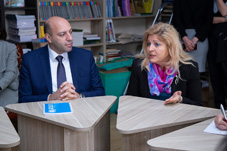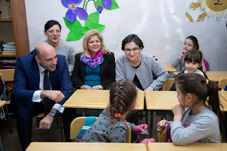
UNICEF Georgia and Govít of Bulgaria to make education more accessible for children out of school
By Levan Abramishvili
Monday, December 2
The Government of the Republic of Bulgaria and UNICEF Georgia have launched a two-year partnership program in cooperation with the Ministry of Education, Science, Culture, and Sport of Georgia to address the issue of out-of-school children. In Georgia, almost 11,200 children aged between 5-17 (2% of total age group children) are out of school, according to the national study on Child Labor in Georgia, conducted in 2016 by the National Statistic Office.
ďAll children and adolescents have the right to quality education. Yet, in Georgia, there are many children, especially from the most socially and economically marginalized groups, who are not benefitting from compulsory education,Ē says UNICEF Georgia.
The program aims to develop a systematic approach to address out-of-school children's challenges and guide concrete reforms in the education sector to ensure the inclusion of vulnerable groups in Georgia's education system and high learning outcomes.
H.E. Dessislava Ivanova, Ambassador of the Republic of Bulgaria to Georgia and Dr. Ghassan Khalil, UNICEF Representative in Georgia together with the representatives of the Ministry of Education marked the launch of the project with a site visit by one of the pilot schools and a day center in Tbilisi.
Through sharing experiences and offering technical assistance, the Republic of Bulgaria's Government and UNICEF will help the Ministry in improving the quality of inclusion in general education
With the aim of sharing experience and providing technical support, the Government of the Republic of Bulgaria and UNICEF will support the Ministry with the improvement of the quality of inclusion in general education.
In particular, the project will enable children and adolescents outside the school to enter or re-enter the mainstream education system and successfully integrate into it. It will also assist them in acquiring the necessary skills and quality learning outcomes to enable them to reach their full potential and increase their readiness for the labor market and ensure success later in life.
UNICEF identifies building a highly-skilled, motivated, and supported teaching workforce as one of the key pillars of achieving high learning outcomes for children in schools.
The pilot program will launch in 15 model schools and six day-care centers. The project aims to assist the Ministry in the creation of national second chance education programs (catch-up and accelerated learning programs) for children currently out of school or at risk of dropping out.
Successful completion of this pilot project will become the foundation for the national extension of Georgia's second-chance education programs.
The education system in Georgia has undergone many reforms during the past two decades. However, access to quality education remains a challenge.
According to UNICEF, Georgia currently provides limited second-chance education programs to provide opportunities for out-of-school children and adolescents to re-enter the formal education process, engage in compulsory education catch-up, attain better learning outcomes, and transition from classrooms to the labor market.
UNICEF also identifies numerous challenges still remaining, for example, system deficiencies such as an underdeveloped teacher training system to supply teachers with skills for student-oriented teaching; a lack of qualified services from caregivers in public day-care centers; a limited availability of teaching and learning resources to catch up as well as a lack of accelerated learning programs in the formal curricula to successfully integrate in regular schools.


